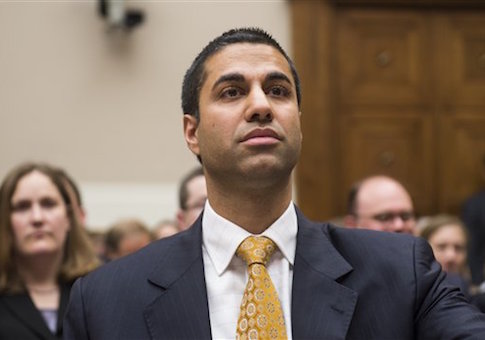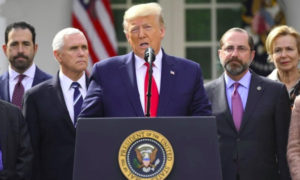FCC’s Relaxing of Media Merger Rules Sets Off an Outcry
The 40-year-old regulations were initially put in place to promote a diversity of viewpoints in the media. Critics worry that allowing more consolidation will mean fewer voices will be heard. Federal Communications Commission Chairman Ajit Pai. (Associated Press)
Federal Communications Commission Chairman Ajit Pai. (Associated Press)
The Federal Communications Commission voted 3-2 Thursday to weaken 1970s-era broadcast ownership regulations, meaning it will now be far easier for media companies to be bought and sold—perhaps leading to just a handful of companies owning most news outlets.
The Washington Post writes:
With the rise of blogs, websites and podcasts, [FCC Chairman Ajit] Pai said, traditional media outlets now face more competition than ever — and rules that once enforced a diversity of viewpoints are no longer needed.
“Few of the FCC’s rules are staler than our broadcast ownership regulations,” Pai said. By eliminating them, he said, “this agency finally drags its broadcast ownership rules to the digital age.”
One long-standing rule repealed Thursday prevented one company in a given media market from owning both a daily newspaper and a TV station. Another rule blocked TV stations in the same market from merging with each other if the combination would leave fewer than eight independently owned stations. The agency also took aim at rules restricting the number of TV and radio stations that any media company could simultaneously own in a single market.
Analysts told The Washington Post that one major beneficiary of the deregulatory moves is Sinclair Broadcast Group, a conservative company that is trying to buy Tribune Media.
Andrew Schwartzman, a Georgetown University scholar on media law, told the Post the impact would be “huge” and that the deregulation will “reduce or eliminate” the need for Sinclair to sell off many of its stations in order to receive regulatory approval to buy Tribune. This is also significant in light of allegations that FCC Chairman Ajit Pai is giving preferential treatment to Sinclair because of the company’s favorable coverage of the Trump administration.
The National Association of Broadcasters lauded the decision, saying in a statement, “These rules are not only irrational in today’s media environment, but they have also weakened the newspaper industry, cost journalism jobs and forced local broadcast stations onto unequal footing with our national pay-TV and radio competitors.”
But some Democratic members of the FCC criticized the move. The Washington Post reports:
“Instead of engaging in thoughtful reform,” said Democratic FCC Commissioner Jessica Rosenworcel, “this agency sets its most basic values on fire.
“As a result of this decision, wherever you live, the FCC is giving the green light for a single company to own the newspaper and multiple television and radio stations in your community. I am hard pressed to see any commitment to diversity, localism, or competition in that result.”
Senate Democrats this week called on the FCC’s inspector general to launch a probe of the agency, over concerns that its impartiality with respect to Sinclair had been “tainted.”
Fifteen U.S. senators voiced similar concerns in a letter to the FCC’s inspector general, asserting that the “merger would never have been possible without a series of actions to overturn decades-long, settled legal precedent by Chairman Pai,” adding that Pai “signaled his clear receptiveness to approving the Sinclair-Tribune transaction and in fact paved the way for its consummation.”
Pai told the Post the belief that the decision would lead to companies buying up newspapers and radio stations to dominate local media markets was “utter nonsense” and that it instead “will open the door to pro-competitive combinations that will strengthen local voices and better serve local communities.”
Commissioner Mignon Clyburn said, “This is really about helping large media companies grow even larger.” She predicted “floodgates to more consolidation,” adding that the deregulation will shut out new entrants to the media landscape, including women and people of color.
Commissioner Michael O’Rielly, a Republican appointee, said he has “no doubt” that the changes would be challenged in court.
Your support matters…Independent journalism is under threat and overshadowed by heavily funded mainstream media.
You can help level the playing field. Become a member.
Your tax-deductible contribution keeps us digging beneath the headlines to give you thought-provoking, investigative reporting and analysis that unearths what's really happening- without compromise.
Give today to support our courageous, independent journalists.









You need to be a supporter to comment.
There are currently no responses to this article.
Be the first to respond.